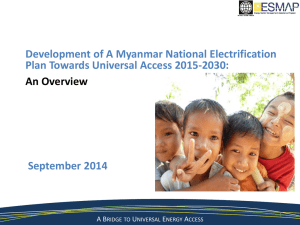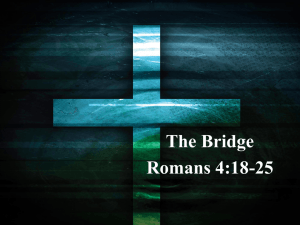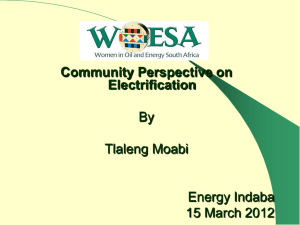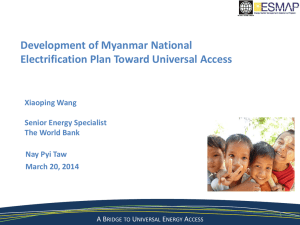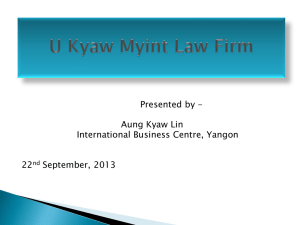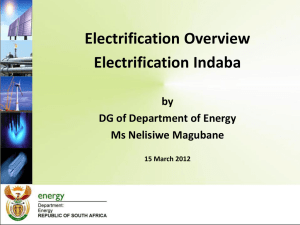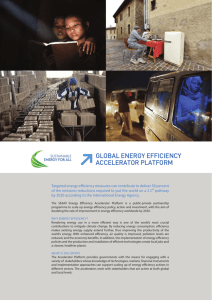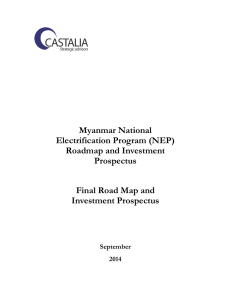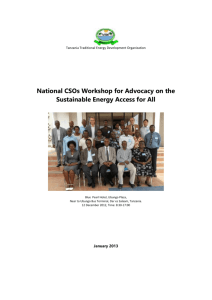WB_Myanmar_workshop_Questions_Reflection
advertisement
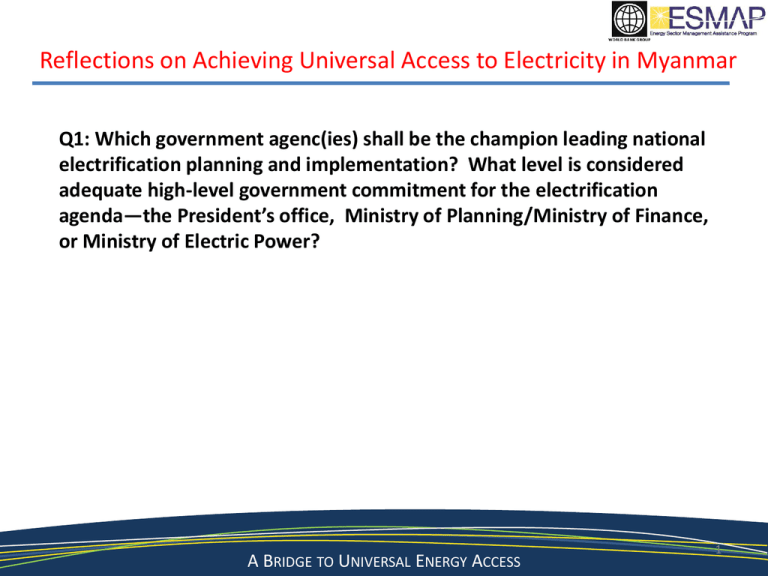
Reflections on Achieving Universal Access to Electricity in Myanmar Q1: Which government agenc(ies) shall be the champion leading national electrification planning and implementation? What level is considered adequate high-level government commitment for the electrification agenda—the President’s office, Ministry of Planning/Ministry of Finance, or Ministry of Electric Power? A BRIDGE TO UNIVERSAL ENERGY ACCESS 1 Reflections on Achieving Universal Access to Electricity in Myanmar Q2: What is the potential role for the private sector in national electrification? A BRIDGE TO UNIVERSAL ENERGY ACCESS 2 Reflections on Achieving Universal Access to Electricity in Myanmar Q3: As the major electric service provider for the areas outside of Yangon, shall ESE be corporatized, privatized, or maintain its current governance structure and operational practice? A BRIDGE TO UNIVERSAL ENERGY ACCESS 3 Reflections on Achieving Universal Access to Electricity in Myanmar Q4: What are the areas of immediate concerns and needs in terms of technical assistance and capacity building related to electrification? A BRIDGE TO UNIVERSAL ENERGY ACCESS 4 Reflections on Achieving Universal Access to Electricity in Myanmar Q5: What would the Government like development partners (donors) to assist in for electrification? A BRIDGE TO UNIVERSAL ENERGY ACCESS 5 Reflections on Achieving Universal Access to Electricity in Myanmar Q6: To carry out the proposed World Bank study on the development of a national electrification program (NEP), what is a suitable organizational arrangement on the government side? Should an inter-ministerial work group be created for this purpose with a secretariat or should MOEP be the single agency leading the study? A BRIDGE TO UNIVERSAL ENERGY ACCESS 6 Context of the Study on the Development of a National Electrification Program To be financed through World Bank/ESMAP Sustainable Energy for ALL (SE4ALL) Technical Assistance Program: The development objective of the overall program is to support the achievement of universal energy access in at least 20 countries by 2030, extending energy access to over 200 million people by assisting countries to establish planning, institutional and policy frameworks that are conducive to investments for scaling up and accelerating energy access programs. A BRIDGE TO UNIVERSAL ENERGY ACCESS 7 Scope of Activities • Stock Taking and Data Collection • Policy and Regulatory Advice • National Energy Access Plans and Strategies – Investment Prospectus • Capacity Building and Knowledge Sharing A BRIDGE TO UNIVERSAL ENERGY ACCESS 8 Country Selection Criteria • Focus on IDA countries (low and lower middle income) • Country must opt in to the global SE4ALL initiative and is committed to the SE4ALL energy access goals. • Presence of other development partners who could be part of a significant resource mobilization effort. • High-impact countries– countries where interventions are likely to create access to large numbers of populations. A BRIDGE TO UNIVERSAL ENERGY ACCESS 9 Current Status of the SE4ALL TA Program World Bank are rolling out the Phase I SE4ALL program in 5 African countries: Senegal, Burundi, Liberia, Mozambique, and Guinea. Myanmar and one South Asia country are candidates under consideration. A BRIDGE TO UNIVERSAL ENERGY ACCESS 10 Reflections on Achieving Universal Access to Electricity in Myanmar Q6: To carry out the proposed World Bank study on the development of a national electrification program (NEP), what is a suitable organizational arrangement on the government side? Should an inter-ministerial work group be created for this purpose with a secretariat or should MOEP be the single agency leading the study? A BRIDGE TO UNIVERSAL ENERGY ACCESS 11
